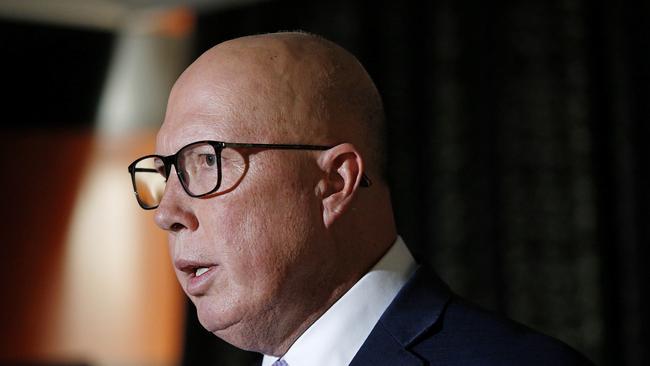Tradies prioritised under Peter Dutton’s trimmed migration program
Peter Dutton’s reduced permanent migration program would include a carve-out for builders, guided by a revamped skills priority list focused on high demand tradie jobs.

Peter Dutton’s reduced permanent migration program would include a carve-out for builders and be guided by a revamped skills priority list targeting the highest-demand tradie jobs to drive construction of new homes.
The Coalition, which has been attacked by Labor over its election pledge to cut the permanent migration program from 185,000 to 140,000 for two years, is planning to fast-track visas for high-priority workers urgently needed to address severe workforce shortages.
Opposition immigration spokesman Dan Tehan said the Coalition would deliver a “rebalanced migration program” designed to ease pressure on housing, congestion and government services.
Amid a housing and rental crisis, and with Labor under pressure to deliver on its commitment to build 1.2 million new homes by 2029, Mr Dutton used his budget reply speech last month to announce a Coalition government would slash the permanent migration program by 25 per cent. It would rise to 150,000 and 160,000 in the third and fourth year.
The Opposition Leader said trimming the migration program, reducing the number of international students and imposing a two-year ban on foreign investors purchasing existing homes would help free up more than 100,000 homes over five years.
Mr Tehan on Tuesday said the Coalition’s program would “ensure there are enough skilled and temporary skilled visas for those with building and construction skills to support our local tradies to build the homes we need”.
“We need a rebalanced migration program that maximises the economic benefits of immigration while managing the impacts on housing, congestion, the environment and government services,” he told The Australian.
“The government’s own workforce experts at Jobs and Skills Australia told them prioritising trades for visas would help reduce housing shortages as part of developing the migration strategy.
“Instead of listening to these independent experts and listing construction workers for priority processing Anthony Albanese ignored this advice and deliberately excluded them.”
In a Sydney Institute speech on Tuesday, Skills Minister Brendan O’Connor warned there were “gaping holes” in Mr Dutton’s migration policy.
Mr O’Connor said Mr Dutton failed to explain how “significantly” cutting the migration program would impact international students, nurses and construction workers, and had provided “vague” details about prioritising skilled tradies from overseas.
Using new Department of Home Affairs data, Mr O’Connor said the government in 2022-23 had granted double the amount of visas to skilled migrants in the housing sector compared to when the Coalition was in power.
Mr Tehan said the government was “boasting about bringing 10,500 construction workers into the country as part of a total migration program that saw 528,000 migrants arrive in Australia in the middle of a housing crisis”.
“That’s less than 2 per cent of Labor’s migrant intake that year. Anthony Albanese would flood your home and expect to be thanked because your plants got a water. The Labor government’s Big Australia policy is making Australia’s housing crisis worse,” he said.
New Grattan Institute analysis on Tuesday said while the Coalition’s plan would ease pressure on the housing market by marginally reducing rents over the long term, it would ultimately scar the economy.
The Grattan paper said cuts to permanent migration would have little impact on housing demand in the short term as close to two-thirds of permanent skilled migrants are already in the country.
It said Mr Dutton’s proposed cuts would reduce rents by incentivising temporary visa holders to return home, resulting in rents being 2.5 per cent lower over a decade.
But the paper warns deep migration cuts would cost the nation significantly because they would reduce the number of permanent skilled visa holders supporting productivity and government budgets.



To join the conversation, please log in. Don't have an account? Register
Join the conversation, you are commenting as Logout